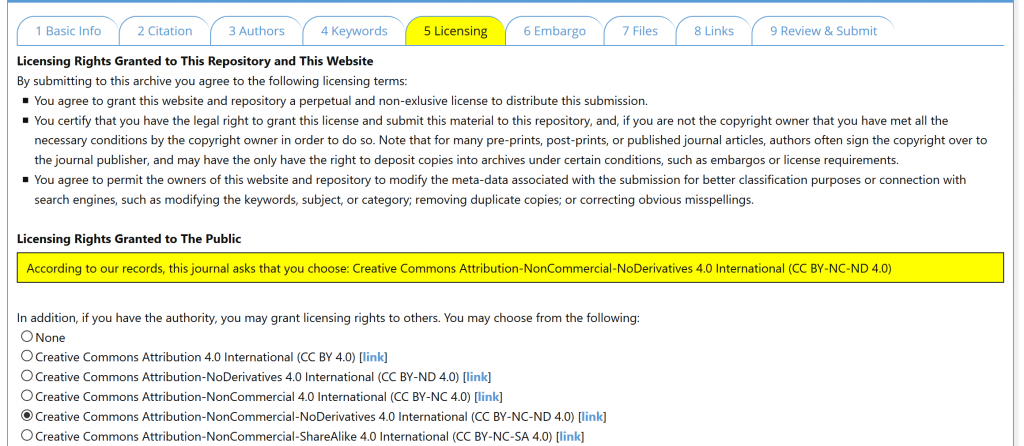We take copyright seriously at PSEcommunity.org. LAPSE was designed specifically to provide researchers and educators with the tools to help them provide their content to the community, satisfy open-access requirements from their funders, and meet the legal requirements of the copyright holders (often publishers). After working with stakeholders such as researchers, professional organizations, conference organizers, and publishers, we have created LAPSE to meet the interests of all parties involved.
LAPSE Does Not Retain Copyright
LAPSE does not hold the copyright for any submissions to the repository. That remains with the original owner. For example, pre-prints (which have not yet been published), presentation slides, educational materials, reports, and other kinds of unpublished works usually are owned by the original author, and the author keeps the copyright when submitting to LAPSE. For published works, such as research articles in non-open access (traditional) journals, copyright usually belongs to the publisher, not the author (unless they are the same). In the same way copyright remains with the publisher in those cases. It is important that if you are not the copyright owner, that you have permission to submit the item to LAPSE, or else you may be violating copyright terms or copyright law, and we would be required to retract the submission.
LAPSE Features That Help Prevent Copyright Violations
LAPSE has unique features designed to help authors prevent common copyright violations which sometimes occur when submitting to repositories. In many cases, authors of research articles are unaware that they are violating copyright restrictions because each individual journal often has its own policies, and copyright transfer agreements are complex. Therefore LAPSE tries to minimize unintentional copyright violation with the following features:
- Embargo Warnings: Each journal usually has its own policy on how long a pre-print, post-print, or published version of an article must be embargoed before it can be made available to the public (see [Pre-prints, Post-prints, and Published Articles]). Users who submit to the repository will be notified if the journal corresponding to a published paper has such an embargo restriction. This is convenient because there are often different embargo periods for pre-prints, post-prints, and publisher versions (with some kinds of submissions forbidden regardless of embargo). Users will be notified that they should use the option of embargoing the work until the specified date, or otherwise not submit to the repository until the date has passed.

- License Suggestions: Users have the option to select common license options (such as Creative Commons variants, GNU Public License variants, etc.) or create their own. Some publishers require or suggest certain kinds of licenses when submitting to open-access repositories or pre-print servers. The user will be notified if the publisher requires a particular kind of license.

- Header Text: Many users do not realize that journals require certain legal texts to be included in pre-print or post-print deposits. Usually, particular wording is required, including links to the publishers version. When submitting pre-prints, post-prints, or publisher versions, LAPSE adds a header page to the main article’s PDF file with useful header information. Where required, the necessary legal text is included, provided the user has provided all of the necessary information.
- Curator Verification: Although submissions (without an embargo) go live as soon as they are submitted, they are marked as “unverified” until a curator has reviewed the record and verified the work. Unverified submissions are kept in a separate section of the website and are not found through keyword, subject, or recent article browsing. Although our curators will try to identify common copyright issues, it is not possible to catch them all. Users with multiple verified works will be elevated to a trusted status such that future deposits will not require human verification. Users who violate copyright have their trust status lowered or possibly banned from future submissions.
General Guidelines for Authors and Submitters
- Ultimately, the submitter is responsible to ensure submissions meet all copyright and licensing terms and conditions which are different for each submission.
- Submit only your own work, or work specifically authorized by the authors.
- Journal article pre-prints usually do not have embargo restrictions, but a few journals do prohibit this.
- Journal article post-prints almost always have embargo restrictions.
- Publisher versions of articles are rarely permitted in LAPSE, unless:
- It is an open-access journal (typically, the authors have paid money for publication fees)
- It is an open-access article in a non-open access journal (authors typically pay money for this, and some institutions, universities, or funding agencies have special arrangements with publishers)
- Special copyright transfer agreements are signed (such as with government agencies, Crown corporations, etc.)
- Books and book chapters can almost never be submitted (including pre-prints), unless it is specifically an open access book.
- Conference slides usually can be submitted in most circumstances.
- Conference proceedings may or may not be permissible, depending on the conference and arrangement with the publishers of the proceedings.
- The copyright for university theses are usually retained by the university and cannot be submitted to the repository. However, some universities have policies that allow repository archiving.
- Consult SHERPA/RoMEO for help in determining journal archiving policies.
How to Report Copyright Violations
Although the LAPSE system can help prevent as much unintended copyright violations as possible automatically, some inevitably will get through, and it is difficult to prevent intentional violations. To report violations, contact abuse@psecommunity.org with the following:
- LAPSE Record or Record URL of the record of interest.
- Link to official published version (if applicable), particularly for journals
- Link to pre-print / post-print policy (if applicable), particularly for journals
- Brief explanation of why the record violates copyright.
We will respond and remove offending content as soon as possible.
